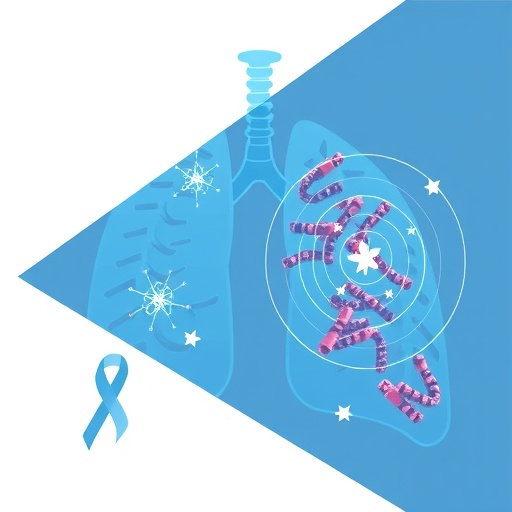In a groundbreaking advance in the fight against lung cancer, researchers have developed a novel therapeutic vaccine candidate that leverages the power of multi-epitope peptides from key tumor-associated antigens. Lung cancer remains one of the deadliest cancers worldwide, with limited effective treatment options. This innovative approach combines nanotechnology with immunotherapy, potentially marking a paradigm shift in lung cancer management.
The study focuses on crafting a peptide-based vaccine incorporating epitopes derived from MAGE-A3, TGF-β2, and VEGF-A — three molecules intimately involved in tumor development and immune evasion. MAGE-A3 is a cancer-testis antigen expressed in various malignancies including lung cancer, making it an ideal tumor-specific target. TGF-β2 plays a critical role in immunosuppression within the tumor microenvironment, while VEGF-A promotes angiogenesis crucial for tumor growth and metastasis. Targeting these molecules concurrently aims to elicit a robust and multi-dimensional immune response capable of attacking lung cancer cells on multiple fronts.
Using sophisticated bioinformatics techniques, the team carefully selected immunogenic peptides from these proteins to optimize vaccine design. The selected peptides were encapsulated within nanoliposomes — tiny lipid-based vesicles approximately 110 nanometers in diameter — which serve as efficient delivery vehicles. This nanoliposomal formulation not only enhances peptide stability and targeted delivery but also favors uptake by antigen-presenting cells, thereby potentiating immune activation.
Experimental evaluation was carried out in Balb/c mice, which were immunized with two dosage levels (10 mg/ml and 100 mg/ml) of the nanoliposomal multi-epitope vaccine. Over a four-week period, a significant induction of IgG antibodies against the composite peptide was observed across both dose groups, detectable even at serum dilutions as high as 1:10,000. This indicates a strong and sustained humoral immune response, a critical factor for effective tumor recognition and destruction.
Beyond antibody production, vaccinated mice displayed heightened secretion of pivotal cytokines including interleukin-4 (IL-4), interleukin-6 (IL-6), interleukin-10 (IL-10), tumor necrosis factor (TNF), and interferon-gamma (IFN-γ). This cytokine milieu underscores the activation of both Th1 and Th2 pathways, suggesting a balanced and potent cellular immune response that can orchestrate effective anti-tumor activity.
To further assess the vaccine’s direct impact on lung cancer cells, sera from vaccinated mice were applied to A549 lung cancer cell cultures. Cell viability assays revealed a dose- and time-dependent reduction in tumor cell survival, complemented by Annexin V/PI staining that confirmed an elevation in apoptotic cell populations. These findings highlight the functional capacity of the vaccine-induced immune factors to impair tumor cell proliferation and induce programmed cell death.
Molecular analyses using real-time PCR shed light on the underlying apoptotic mechanisms. Lung cancer cells treated with post-vaccination sera exhibited downregulation of the anti-apoptotic gene Bcl2 alongside upregulation of the pro-apoptotic gene Bax. This shift in the Bcl2/Bax ratio favors apoptosis, indicating that the immune response triggered by the vaccine promotes cancer cell elimination through intrinsic cell death pathways.
Perhaps the most compelling evidence emerged from studies in humanized patient-derived xenograft (PDX) mouse models — a gold standard for preclinical cancer immunotherapy testing. Immunized PDX mice demonstrated a dramatic reduction in tumor volume, shrinking from an average of approximately 500 cubic millimeters to near 50 cubic millimeters over five weeks. This striking tumor regression underscores the potent therapeutic efficacy of the multi-epitope nanoliposomal vaccine in a clinically relevant setting.
The exceptional formulation properties of the vaccine also deserve attention. Characterization revealed that the nanoliposomes maintained a mean diameter of around 110 nm, ideal for lymphatic system trafficking and cellular uptake, along with a positive surface charge (zeta potential +30 mV), which facilitates interaction with negatively charged cell membranes. Impressively, peptide loading efficiency reached as high as 98%, indicating remarkable encapsulation fidelity necessary for consistent dosing and immune stimulation.
This comprehensive study exemplifies the integration of computational biology, nanotechnology, immunology, and preclinical cancer models to engineer a next-generation therapeutic vaccine. By targeting multiple tumor-associated antigens simultaneously, this design seeks to circumvent tumor heterogeneity and immune escape mechanisms that plague monotherapy strategies. The elicited immune responses demonstrated both breadth and depth, engaging humoral and cellular arms to suppress tumor progression effectively.
Importantly, the vaccine’s safety profile appeared favorable, with no overt toxicity reported in immunized mice throughout the observation period. This aspect is crucial for the translational potential of the vaccine, as balancing potency with tolerability remains a key challenge in cancer immunotherapy development.
Looking forward, this promising candidate sets the stage for further optimization and eventual clinical trials. Combining such multivalent peptide vaccines with conventional therapies or immune checkpoint inhibitors could amplify therapeutic outcomes and provide durable remission for lung cancer patients who currently have limited options.
In an era where precision medicine and personalized immunotherapy are revolutionizing oncology, this study offers a beacon of hope. The rational design and successful preclinical evaluation of a nanoliposomal multi-epitope vaccine against lung cancer illuminate a promising path toward effective, safe, and targeted cancer vaccines that harness the power of the immune system.
As researchers deepen our understanding of tumor immunobiology and nanoparticle delivery systems, therapeutic vaccines exemplified by this study are poised to emerge as vital weapons in the oncologist’s arsenal, transforming lung cancer from a formidable adversary into a manageable condition.
Subject of Research: Therapeutic vaccine development targeting lung cancer using multi-epitope peptides from MAGE-A3, TGF-β2, and VEGF-A encapsulated in nanoliposomes.
Article Title: Design, synthesis, and evaluation of A therapeutic vaccine candidate against lung cancer based on multi-epitopes of MAGE-A3, TGF-β2, and VEGF-A.
Article References:
Mokhtari, V., Hashemi, M., Marandi, S.J. et al. Design, synthesis, and evaluation of A therapeutic vaccine candidate against lung cancer based on multi-epitopes of MAGE-A3, TGF-β2, and VEGF-A. BMC Cancer 25, 1632 (2025). https://doi.org/10.1186/s12885-025-14950-y
Image Credits: Scienmag.com
DOI: https://doi.org/10.1186/s12885-025-14950-y
Tags: bioinformatics in vaccine designinnovative lung cancer management strategieslung cancer immunotherapy advancementsMAGE-A3 as a cancer targetmulti-dimensional immune response to cancermulti-epitope vaccine for lung cancernanoliposomes for drug deliverynanotechnology in cancer treatmentpeptide-based cancer vaccinesTGF-β2 role in tumor immunosuppressiontumor-associated antigens in cancer therapyVEGF-A and cancer angiogenesis





